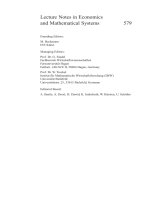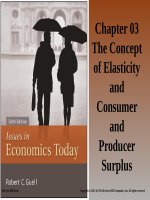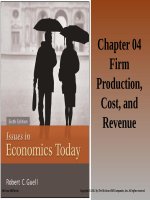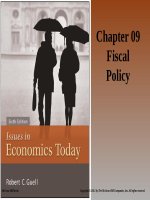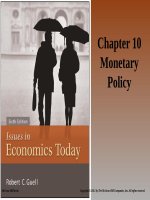Lecture Issues in economics today - Chapter 33
Bạn đang xem bản rút gọn của tài liệu. Xem và tải ngay bản đầy đủ của tài liệu tại đây (245.21 KB, 15 trang )
Chapter 33
Minimum Wage
McGrawHill/Irwin
© 2002 The McGrawHill Companies, Inc., All Rights Reserved.
Chapter Outline
• TRADITIONAL ECONOMIC ANALYSIS
OF A MINIMUM WAGE
• REBUTTAL TO THE TRADITIONAL
ANALYSIS
• WHERE ARE ECONOMISTS NOW?
McGrawHill/Irwin
© 2002 The McGrawHill Companies, Inc., All Rights Reserved.
Why Have a Minimum Wage
• The argument for a minimum wage is
that people who work full time should
not be in poverty. This combines two
concepts:
– Minimum Wage: the lowest wage that may
legally be paid for an hour’s work
– Living Wage: a wage sufficient to keep a
family out of poverty
McGrawHill/Irwin
© 2002 The McGrawHill Companies, Inc., All Rights Reserved.
F - T M in W /P o v e r ty L i
Full-Time Minimum
by family size
2
1.8
1.6
1.4
1.2
1
0.8
0.6
0.4
1959
1962
1965
1968
1971
1974
1977
1980
1983
1986
1989
1992
1995
1998
Year
One
McGrawHill/Irwin
Two
ThreeFour
© 2002 The McGrawHill Companies, Inc., All Rights Reserved.
Nominal and Real M
W age
8
6
4
2
0
1938
1943
1948
1953
1958
1963
1968
1973
1978
1983
1988
1993
1998
Year
Nominal
Real
McGrawHill/Irwin
© 2002 The McGrawHill Companies, Inc., All Rights Reserved.
Minimum Wage Increases
• The Federal minimum wage was
originally set at 25 cents per hour.
• There have been 18 increases.
• In 2001 it was $5.15 per hour.
• To be equal to its 1968 high in inflationadjusted terms it would need to have
been close to $8 per hour in 2001.
McGrawHill/Irwin
© 2002 The McGrawHill Companies, Inc., All Rights Reserved.
The Labor Market without a
Minimum Wage
W
Supply
A
•
•
W*
C
•
B
•
0
L*
McGrawHill/Irwin
Demand
Labor •
Value to the firms:
• 0ACL*
Firms pay workers:
• OW*CL*
The opportunity cost to workers:
• OBCL*
Surplus to firms:
• W*AC
Surplus to workers:
• BW*C
© 2002 The McGrawHill Companies, Inc., All Rights Reserved.
Minimum Wage Relevance
• A minimum wage is only relevant if it is
above the market wage.
• A minimum wage below the market
wage is irrelevant.
– The company must pay the market wage to
attract workers.
– Paying below the market wage is not in its
interests because such a wage would not
attract sufficient workers to the company.
McGrawHill/Irwin
© 2002 The McGrawHill Companies, Inc., All Rights Reserved.
What’s Wrong with the
Minimum Wage
• The gain to the workers who keep their
jobs is less than the loss to the losers
who
– lose their jobs and
– are firms who have to pay higher wages.
McGrawHill/Irwin
© 2002 The McGrawHill Companies, Inc., All Rights Reserved.
Demonstrating the Case
Against the Minimum Wage
W
Supply
A
E
Wmin
W*
C
F
B
0 Lmin L* LS
McGrawHill/Irwin
Demand
Labor
•
Value to the firms:
• 0AELmin
•
Firms pay workers:
• OWminELmin
•
The opportunity cost to workers:
• OBFLmin
•
Surplus to firms:
• WminAE
•
Surplus to workers:
• BWminEF
•
Unemployed workers
• Who had jobs
• L*-Lmin
• Who are now looking
• LS-L*
© 2002 The McGrawHill Companies, Inc., All Rights Reserved.
The Case Against (continued)
• An increase in the minimum wage by 10%
decreases the number of jobs held by teens
by 1% to 3%.
• A minimum wage increase negatively affects
– small businesses more than larger firms.
– minorities more than whites.
• A majority of minimum wage workers are
young adults who are not supporting families.
An increase in the minimum wage is an
inefficient mechanism for helping poor
working families.
McGrawHill/Irwin
© 2002 The McGrawHill Companies, Inc., All Rights Reserved.
The EITC Alternative to the
Minimum Wage
• The earned income tax credit (EITC)
– is a targeted tax credit to the working poor.
– was, in 2000, as much as $3,888 for a
working poor family with two children.
McGrawHill/Irwin
© 2002 The McGrawHill Companies, Inc., All Rights Reserved.
The Rebuttals to the
Traditional Analysis
• The Macroeconomic Argument
– The money that is transferred from employers to
employees in more likely to be spent than saved
thereby increasing GDP.
• The Work Effort Argument
– People who are paid more may work harder than
people who are paid less. This may return some of
the increased wage paid by employers back to
them in terms of increased productivity.
• The Inelasticity of Labor Demand Argument
– If the demand for labor is inelastic then there is
less of a loss in employment and a smaller
deadweight loss.
McGrawHill/Irwin
© 2002 The McGrawHill Companies, Inc., All Rights Reserved.
Demonstrating the Inelasticity
Argument
W
Supply
E
Wmin
W*
F
C
B
Demand
0
McGrawHill/Irwin
Lmin L*
Labor
© 2002 The McGrawHill Companies, Inc., All Rights Reserved.
Where are Economists Now
• Economists have long been against the
minimum wage and for the EITC.
• Card and Kruger challenged many of the
long-held conclusions in the 1990s with
research verifying the Inelasticity Argument.
• For most labor economists, subsequent
research has re-verified the original pro-EITC,
anti-minimum wage argument.
McGrawHill/Irwin
© 2002 The McGrawHill Companies, Inc., All Rights Reserved.
